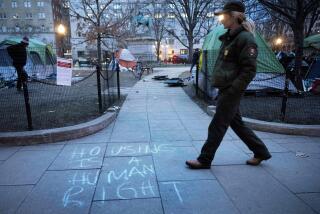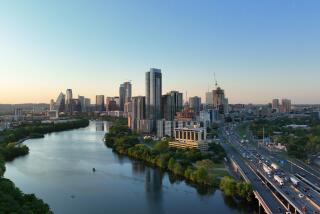Bush Staffers Need Texas-Sized Riches for Washington Duty
- Share via
WASHINGTON — From rent to groceries to galoshes, the new president’s men and women are discovering what Bill Clinton’s Arkansans and other presidents’ aides learned before them: Washington is one expensive town.
Faced with sticker shock at almost every turn, the transplanted Texans are having to make Lone Star State-size adjustments.
“I came here with a budget, but my first day here, I realized my budget doesn’t exist in this city,” said Adam Goldman, a political aide to George W. Bush when he was governor and now associate director of the White House Office of Public Liaison.
In all, 200 to 300 Texans who worked in the Bush campaign have moved to Washington.
Austin, where most of them lived, is at 100 on a Money magazine cost-of-living index ranking 328 cities from cheapest to most expensive. Washington is at 300, not too far behind cost leader New York City. For comparison, Miami is at 248, Chicago 267, Los Angeles 307.
Reed Dickens, a staff member in the White House press office, says he heads to a local grocery with his roommate just to get a kick out of the prices. “Everything you touch there is $6.99, at least twice what it’s worth.”
New White House staffers say they adjusted their rent expectations upward by $200 to $300--only to realize they needed to double that adjustment.
“I came up here with the naive assumption you could find a nice place to live for $500-$600 a month,” said Dickens. Now he’s paying $950 across the Potomac River in the Crystal City area of Arlington, Va., and that’s half of the $1,900 rent he shares with his roommate.
Part of his problem was that he started in mid-December, after the Supreme Court decision settling the election for Bush. “Landlords kept on saying, ‘You waited too late.’ What could we do?”
There are sticker shocks in wardrobe expenses as well.
“Two years on the campaign, my uniform was khaki pants and Nikes,” said Amanda Moore, Bush’s deputy director of scheduling. “Before coming here, I bought a bunch of suits.”
Dressier wear alone doesn’t cut it--there’s the consideration of an average annual 16 inches of snow, instead of just one inch in Austin.
“Walking back from the inauguration in my dress shoes with leather soles, I realized why friends advised me to get galoshes,” Goldman said. “I had to leave them out drying two days.”
He bought the galoshes, and is planning to get a heavy winter coat to replace the rain slicker he brought with him.
Then there’s eating out, the principal sustenance of people adjusting to 12-hour workdays. “I consider myself lucky if I find a restaurant with a $15 entree,” Goldman said, and that’s $5 more than he was used to paying in Austin.
Staffers would not reveal their salaries. Former Clinton administration aides said an equivalent press officer in their White House would have made $25,000 to $35,000, a senior liaison officer $55,000 to $75,000 and the scheduling deputy about $100,000.
Dickens said he was getting paid only marginally more than he did when he worked in the Bush campaign’s treasury office; Goldman said he took a 15% pay cut.
It’s not just the pocketbook that shocks--Washington’s pace does too.
“I never had to think about getting dry-cleaning done, going to the bank,” Dickens said. “Those were things that you did on your way to work.”
Now, the 23-year-old has to schedule time for small errands in a busy workweek.
“I’m paying my 17-year-old brother to come up this weekend to buy furniture for me; I just don’t have the time.” Does he trust a teenager’s taste? “I don’t have a choice.”
But there are payoffs. Moore likes the city’s more cosmopolitan feel.
“Dinner doesn’t start an evening out, it is an evening out,” she said.
Being able to walk from place to place is also nice, they said.
“In Austin, you have to get in your car for 20 minutes just to go out and get a bite,” Moore said.
The staffers said they were enjoying Washington’s greater variety of entertainment venues--when they had the time. In Money magazine’s “leisure index,” Washington, replete with some of the best museums in the world--most free--ranks at 59, with 100 the best. Austin is at 13.
But they miss some things. Dickens longs for the bayous of his Shreveport, La., upbringing--”I can’t believe I took that for granted.”
Moore and Goldman say they are wary about even trying Washington’s Tex-Mex offerings.
“I haven’t heard good things,” Moore said. “I might have some flown in.”
(BEGIN TEXT OF INFOBOX / INFOGRAPHIC)
By the Numbers
A comparison of the cost of living and some other aspects of life in Washington and Austin, Texas, according to Money magazine’s city rankings:
Metropolitan area population
Austin: 1 million
Washington: 4.6 million
Cost of living
Austin: 100th out of 328 cities (328th the most expensive)
Washington: 300th
Median home price
Austin: $130,100
Washington: $176,400
National average: $128,570
Property taxes per $1,000 of home value
Austin: $21.90
Washington: $11.70
National average: $15.64
Annual auto insurance rates
Austin: $860
Washington: $1,100
National average: $829
Annual days with mostly sun
Austin: 231
Washington: 207
National average: 213
Annual inches of snow
Austin: 1
Washington: 16
National Average: 24
Violent crime per 100,000 people
Austin: 399
Washington: 527
National average: 506
Arts index (100 is best)
Austin: 15
Washington: 56
National average: 11.5
Air quality index (higher is better)
Austin: 46
Washington: 62
National average: 66
Search 328 cities on the Net:
www.money.com/money/depts/real--estate/bplive
More to Read
Get the L.A. Times Politics newsletter
Deeply reported insights into legislation, politics and policy from Sacramento, Washington and beyond. In your inbox twice per week.
You may occasionally receive promotional content from the Los Angeles Times.










